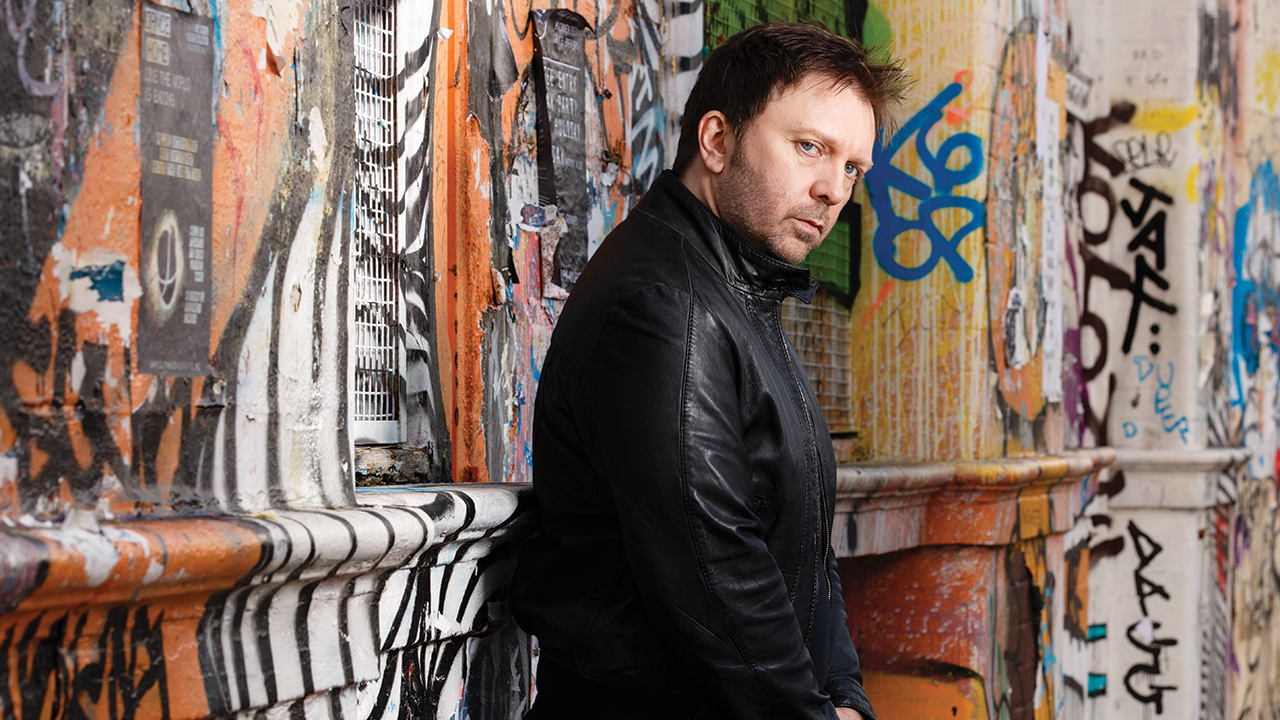In this magazine’s 2014 list of The 100 Greatest Prog Albums Of All Time, there, beside the inevitable classics by Yes, Genesis, ELP and King Crimson, was Six, the madcap multi-section masterpiece by Mansun, one place ahead of Radiohead’s OK Computer. Radiohead’s third album might have earned the plaudits, but it’s Mansun’s follow-up to their chart-topping 1997 debut Attack Of The Grey Lantern that has become the cult favourite among prog musicians. Steven Wilson (who has recorded two tracks with Draper) extolled its virtues in Prog, while Public Service Broadcasting proclaimed it their favourite album of all time. Even Radiohead believed Mansun were the better, more adventurous outfit.
“When Ed O’Brien [guitar] picked up an award for OK Computer, he said, ‘I feel really bad about this because Attack Of The Grey Lantern was the real musical achievement this year,’” notes Paul Draper, who was so blitzed by the fallout from Six that he’s still recovering. “Then Colin [Greenwood, bass] said he went to the mastering suite in secret to hear Six and said, ‘There’s no way we can beat that.’”
Draper himself struggled to match Six – or rather, he was stymied by the rest of the band, management and label, EMI. There was one more album, 2000’s more conventional Little Kix, and a fourth was attempted (the aborted sessions became the posthumous 2004 release Kleptomania). But a clash of musical approaches (Draper wanted to pursue his vision while the others, he claims, intended to become a glorified jam band) and intra-band tensions caused by drugs and financial malpractice brought proceedings to a violent close.

“It all turned to shit,” Draper told this writer in 2006. He was still so incensed that he refused to name his bandmates. “We sacked the bass player, who’d been taking hundreds of thousands from our account. When we confronted him, he broke down on the floor, crying, ‘I’m evil, I need help.’
“I tried to keep it together and, in 2003, we booked the house [St Catherine’s Court, near Bath] where Radiohead recorded OK Computer,” he recalls, back in the present, of Mansun’s dark, final days.
Things got so twisted they even found themselves having a séance “with a load of witches from Somerset”, during which they were gifted psychic drawings and Draper “nearly shat himself” when a massive log fell off the fire, causing a black cat to launch itself into mid-air.
The atmosphere was, by all accounts, murderous. One night it “all kicked off” after several of the band broke into the wine cellar, picked out the best bottle of champagne and “got twatted”. There was, as a result, “a lot of shouting and aggro”, culminating in guitarist Dominic Chad punching his hand into a brick wall and winding up in hospital on a morphine drip. As for Draper, he stormed out of the studio after he was “headbutted in the face” by one of the band.
In the immediate aftermath, the stress of it all made him ill – not just emotionally (“People were saying I was a delusional paranoid schizophrenic”) but physically: he got a malignant tumour and had to have five courses of radiation therapy before having it cut out. The repercussions linger to this day.
“There were knives involved, the police were involved – a lot of stuff,” he says. “That [series of violent altercations] was just the straw that broke the camel’s back. It goes a lot deeper than that.”
Does he care to elucidate?
“I can’t,” he says, “for legal reasons.”
Draper was so traumatised by the events of 1996-2003 – most of Mansun’s duration – that he withdrew into writing and production for other artists. It wasn’t until he teamed up with Catherine Anne Davies, aka Catherine AD, that he made his tentative first steps back into the limelight. The pair worked on The Anchoress project, winner of Prog’s Best Newcomer at the 2016 awards, recording Davies’ Confessions Of A Romance Novelist album and a couple of EPs for Draper (2016’s One and Two).
And now he’s issuing his debut solo album, Spooky Action, comprising material he’s been amassing since the death of Mansun. If Confessions… saw Davies sing and write the lion’s share with some input from Draper, this flips the script: it’s his mordant vocals (with some backing vocals from Davies) and his songs, seven of them co-written with Davies. It’s a superb partnership – think Fleetwood Mac’s Buckingham-Nicks, only “without the fucking and cocaine” (see panel) – with a fractious dynamic that works.
It has certainly teased a riveting album out of Draper: an exorcism of sorts, as he rids himself of the negativity that has been consuming him for this past decade or so. The titles – Jealousy Is A Powerful Emotion, Friends Make The Worst Enemies, You Don’t Really Know Someone, Til You Fall Out With Them – offer hints as to the contents. The lyrics, peppered with references to ‘imploding’ and ‘destruction’, provide further clues: it’s the lexicon of loathe writ large.
The music, meanwhile, is all angry guitars and vicious, viscous synths, sounding like someone slashing and burning their way through the Mansun catalogue. That’s hardly surprising considering the instruments employed – Minimoogs, Prophet 5s, Les Pauls – were borrowed from a collector whose hobby is tracing the gear Mansun used on their records and buying it back.
“It’s the weirdest cycle of connection,” Draper says cheerily at the offices of his new label, Kscope, home of The Anchoress, Anathema, Ian Anderson and others.
It was one of the label’s bosses, Johnny Wilks, who insisted on getting Draper on board. “He told me, when he started Kscope, they made a list of people they wanted, and I was number one,” Draper tells Prog. He laughs. “I bet he says that to all the girls.”
Apparently, the first thing Kscope asked Draper was, “Do you have any long songs?” He proffered one from Spooky Action called Grey House that came in at nine minutes. Close, but no cigar. “They said, ‘No, what we mean is more like 16-17 minutes.’”
Still, Spooky Action is pretty prog – angular, intense, prone to sudden shifts of tempo and mood. But is it the revenge of Paul Draper?
- Paul Draper - Spooky Action album review
- The TeamRock+ Singles Club
- TeamRock Radio app back on Apple’s app store
- The 10 best Mansun songs chosen by Paul Draper
“No,” he replies. “This is the diary of what happened to me in Mansun. It’s the biggest cliché: musicians saying, ‘Oh, this is my most personal record.’ But that’s what it is: a record of my angry, emotional responses to being badly done by. It’s cathartic.”
More songs about disillusion and betrayal?
“There’s a lot of betrayal on there, and destruction,” he admits. “The word ‘destroy’ was in every song. ‘Evil’, ‘psychopath’, ‘stab in the back…’ Catherine was good with quality control. She told me, ‘You can’t keep saying the same thing in different ways.’”
The barely controlled venom in his lyrics is justifiable: his has been a history of epic animosity. “Absolutely huge, yeah,” he agrees, reflecting on the alienating setup in Mansun. “There were basically two factions: the other three and me. Then again, The Beatles all individually felt the same way: that they were all outsiders in their own band.”
‘I live on the underground, on the edge of society,’ Draper sings on Grey House. It’s as though he’s in a permanent state of at-tension. On the brilliant LP closer, The Inner Wheel, with its awesome, glowering coda, there is a none-more-Draper lyric: ‘Is medication the answer or is ignorance bliss?/Diagnosis of anxiety…’
He’s still haunted by his past. Or as he puts it: “I’m a recovering damaged Brit prog star who has vented my emotional deficiencies through a record and is hoping it flogs enough copies to do another one.”
You can see why he wanted to be a solo artist originally: alone in the studio, with no one else to spoil his solipsist daydreams amid the beautiful gadgetry.
“My ultimate hero was Prince. Prior to that it was The Beatles – I loved all those old black and white shots of them sitting around Abbey Road with George Martin, surrounded by microphones…”
We know what happened to the Fab Four: the dream was soon over. The same for Mansun: one minute, the proverbial ‘big in Japan’, being chased across Tokyo by screaming schoolgirls, the next they were fighting for supremacy. In fact, that power struggle began while they were in Japan. Later, down the pub, Draper will say of Mansun, “They tried to have me killed,” although he declines to expound. Still, it perhaps explains why he was nervous about rejoining the music biz fray.
“I didn’t go looking to be a solo artist – I didn’t think I had it in me,” he says, two pints in. “I thought, ‘I’m out of the game here.’”
Luckily, he found a sympathetic ally in The Anchoress – although, as we now know, even that pairing has had its fraught moments.
“I used to be the dictator, pissing everyone off with the minutiae of it all. Now she’s taken over that role,” Draper says, praising “the depth of Davies’ knowledge” and the way she gets stuck into every aspect of the recording process, from playing and singing to setting up the mics and inputting effects. “She’s very driven. Basically, she’s me, 20 years ago.”
In a separate, earlier interview, Davies told Prog that she and Draper had a falling out a couple of years back. When I mention this, he bristles a bit.
“I fall out with Catherine every month,” he says, sighing. “I blame her and she blames me. It’s always her that storms out. Does she say it’s always me? With any dynamic duo in the music industry, each person will say the other is useless and that ‘I do all the work.’ There’s an element of that to it.”
He cites other examples of artists and collaborators jostling to take the kudos. “Look at Tony Visconti. Bowie’s body wasn’t even cold and he was saying, ‘I’m David Bowie.’ Or Mark Ronson and Amy Winehouse: their last big fallout was over that: ‘You’re nothing without me.’ I’m beyond that.”
Draper is a sensitive, troubled soul. Now all he’s got to do is keep using that torment to make searing, affecting, electroid rock’n’roll like Spooky Action.
“It’s a fascinating story within industry circles, what happened to Mansun,” he says, citing the lyric to Spooky Action’s Jealousy Is A Powerful Emotion: ‘A cautionary tale for sure/Where there’s money, power, there is treason.’
He could have been a contender: “Turn a different corner, as George Michael said, and we could have been a Muse.”
Just don’t rule out late stardom (again) for the 40-something. After all, it’s happening for Steven Wilson. Who knows? Draper might even find happiness.
“The more music I do in the present,” he concludes, before heading off to watch Kraftwerk perform at the Royal Albert Hall, “the less the past will hurt.”
Spooky Action is out on August 11 via Kscope. See www.pauldraperofficial.com for more information.

“He’s a fucking diva!”
Catherine AD shares her thoughts on working with Paul Draper…
“Spooky Action is quite prog-electronic – that’s what I brought to the table. The guitar on Who’s Wearing The Trousers sounds like Robert Fripp. The paradigm for our partnership probably isn’t Bowie-Eno, though: Bowie brought the songs and Eno the sonics. I work on the music and bring a consideration for lyrical content. These are more autobiographical and personal than any Paul has written. They’re about the journey he’s been on since the disintegration of Mansun.
“Paul and I had a big falling out and didn’t see each other for four or five months – the song You Don’t Really Know Someone, Til You Fall Out With Them is about our working relationship. Any partnership is going to have its difficulties. But we’ve worked together for longer than he was in Mansun, so that’s got to stand for something.
“What did I learn about Paul during our falling-out? I don’t know if I want to go there. He’s fucking difficult sometimes, as we all are. I try to make it work as best I can, but sometimes you just need a break from each other.
“I sit at the piano, he sits with a guitar, and we write songs together: ‘magic’ is the word Paul uses. We’re always pushing against each other, coming up with these inverted chords, and what comes out is this sweet, melodic thing that we don’t have when we work on our own.
“We’re Buckingham-Nicks, only without the fucking and cocaine. Annie Lennox and Dave Stewart is another good analogy – with Paul as Annie. He’s the fucking diva, I’ll tell you. He can be a bit touchy. But I wouldn’t work with him if he wasn’t great. I just focus on that when it’s difficult. I’m sure he’d say I was equally a pain in the arse. But he must need me for something.”

